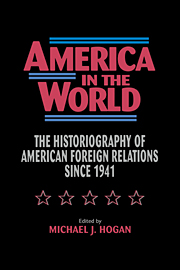Book contents
- Frontmatter
- Contents
- Preface
- The Authors
- Part One The State of the Art
- Part Two The Historiography of American Foreign Relations since 1941
- 6 The Historiography of American Foreign Relations: An Introduction
- 7 A Half-Century of Conflict: Interpretations of U.S. World War II Diplomacy
- 8 The Decision to Use the Bomb: A Historiographical Update
- 9 Origins of the Cold War in Europe and the Near East: Recent Historiography and the National Security Imperative
- 10 Making Known the Unknown War: Policy Analysis of the Korean Conflict since the Early 1980s
- 11 Eisenhower Revisionism: The Scholarly Debate
- 12 John F. Kennedy as World Leader: A Perspective on the Literature
- 13 The Unending Debate: Historians and the Vietnam War
- 14 Complaints, Self-Justifications, and Analysis: The Historiography of American Foreign Relations since 1969
- 15 An Emerging Synthesis? U.S.–Latin American Relations since the Second World War
- 16 Gideon's Band: America and the Middle East since 1945
- 17 The Cold War in Asia: The Elusive Synthesis
- 18 The Power of Money: The Historiography of American Economic Diplomacy
- 19 Coming in from the Cold War: The Historiography of American Intelligence, 1945–1990
- Index
10 - Making Known the Unknown War: Policy Analysis of the Korean Conflict since the Early 1980s
Published online by Cambridge University Press: 05 June 2012
- Frontmatter
- Contents
- Preface
- The Authors
- Part One The State of the Art
- Part Two The Historiography of American Foreign Relations since 1941
- 6 The Historiography of American Foreign Relations: An Introduction
- 7 A Half-Century of Conflict: Interpretations of U.S. World War II Diplomacy
- 8 The Decision to Use the Bomb: A Historiographical Update
- 9 Origins of the Cold War in Europe and the Near East: Recent Historiography and the National Security Imperative
- 10 Making Known the Unknown War: Policy Analysis of the Korean Conflict since the Early 1980s
- 11 Eisenhower Revisionism: The Scholarly Debate
- 12 John F. Kennedy as World Leader: A Perspective on the Literature
- 13 The Unending Debate: Historians and the Vietnam War
- 14 Complaints, Self-Justifications, and Analysis: The Historiography of American Foreign Relations since 1969
- 15 An Emerging Synthesis? U.S.–Latin American Relations since the Second World War
- 16 Gideon's Band: America and the Middle East since 1945
- 17 The Cold War in Asia: The Elusive Synthesis
- 18 The Power of Money: The Historiography of American Economic Diplomacy
- 19 Coming in from the Cold War: The Historiography of American Intelligence, 1945–1990
- Index
Summary
The Unknown War, The Forgotten War, Korea: The War Before Vietnam – these titles and subtitles of studies of the Korean conflict published in the mid- to late 1980s give some indication of the perceived status of that event, especially in comparison with what many have seen as its offspring, or close relative, the war in Vietnam. Roger Dingman once described the neglect of Korea as resulting from its being sandwiched between the “good war” and the “bad war”; and Joseph Goulden attributed that neglect to the conflict's uninspiring nature. It was an event that most Americans were “eager to permit to slip through the crevices of memory.”
The outcome has been that it has taken over thirty years for the moral and intellectual questions raised by these hostilities to be exposed and debated. For example, we have only recently discussed whether a domestic revolution with potentially regional repercussions was stopped on the peninsula in June 1950, whether the push into South Korea was a case of Southern entrapment, or of Soviet and/or North Korean aggression, whether U.S. threats to use atomic weapons were either effective or justified, and whether the costs suffered by all sides – but especially by the Koreans – in this enormously destructive war were commensurate with a negotiated settlement that plainly did not provide the basis for an eventual reunification of the peninsula.
For years, David Rees's book – an orthodox analysis that reflected and reinforced Washington's own interpretations of the war's origins and course – stood as the standard account of the war.
- Type
- Chapter
- Information
- America in the WorldThe Historiography of US Foreign Relations since 1941, pp. 270 - 299Publisher: Cambridge University PressPrint publication year: 1996
- 1
- Cited by



